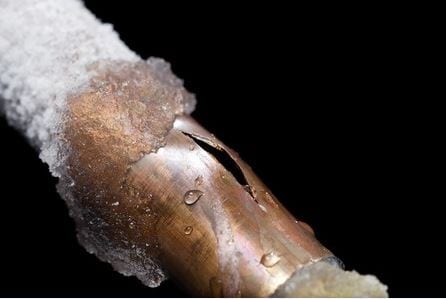One of the perils of owning a home during the freezing cold winters is the possibility of a frozen pipe. Pipes that run through unheated spaces, such as crawl spaces, attics and garages, or along exterior walls with little insulation are susceptible to freezing during the cold winter months. Worse, if the water in the pipes freeze, chances are that the pipe may burst or crack, which will lead to leaks and serious water damage once the ice thaws.
When water freezes, it expands, and that expansion creates pressure within your home’s pipes. If your pipes have any weaknesses, like rusted spots, cracks or slight corrosion, they will likely crack or burst at those weak points due to that immense pressure caused by the freezing water.
Burst pipes can be a big hassle to deal with. Not only do you need to worry about cleaning up the water damage and possibly replacing belongings which could make this quite expensive.
Luckily, there are a few things you can do to avoid burst pipes. The first thing you should do is to remove all garden hoses from the exterior faucets. If you have an older house that has a shutoff on the inside of the house to drain the line for the outside faucet make sure to turn off the water on the inside and open the outside faucet to drain all of the water out of the pipe.
Next, make sure your crawl space vents are closed and sealed to prevent the cold air from entering the crawl space. The new theory is to seal your vents and keep them sealed year round to help with energy efficiency. You can also add insulation to waterlines in basements or crawlspaces as an extra precaution.
If you’re going on vacation, turn can turn off your water and drain the faucets to remove excess water from the pipes. Do not turn your heat off, though – you can turn it down, but turning it off will most certainly cause problems. Leave the cabinet doors open beneath your sinks, as well, as this will allow heat to get in and keep the pipes warm. Do not turn off the water if you have a water backup system on your sump pump. If power goes out or your sump pump fails, the water backup sump pump will operate only if the water to the house is turned on. This will hopefully keep the basement from flooding.
Smart thermostats are also a good option since they can alert you when the temperature in the house goes below a temperature you set. This may tell you if the furnace isn’t working due to a power outage or a furnace failure.
Keep these tips in mind for taking care of your pipes during the winter.

